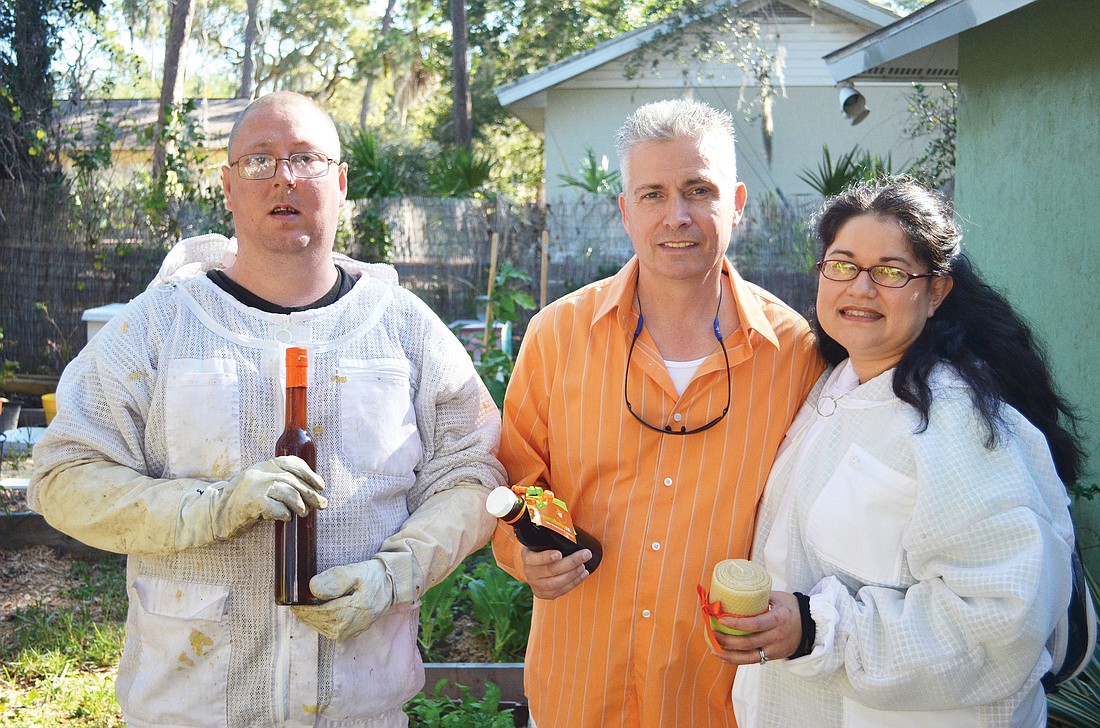- January 14, 2025
-
-
Loading

Loading

From a distance they seem like ordinary wooden boxes. Four waist-high stacks stand in the corner of Alma and Glenn Johnson’s backyard, just off of North Tamiami Trail. The boxes are hand painted in bright colors, such as purple, orange, green and red. However, as one gets closer to these boxes, a faint hum grows into a clear and distinct sound — buzzing.
Those boxes are the heart of a local small business, the Sarasota Honey Co., that not only produces quality goods but also provides employment for Sarasota’s special-needs community.
At eight locations, including at Sweetgrass Farms, Myakka, and private residences in Sarasota, the Johnsons and their staff of special-needs children and adults tend approximately 70 colonies containing thousands of Italian honeybees. The Johnsons and staff are certified beekeepers by the Florida Department of Agriculture and Consumer Services. They tend to the hives every week by feeding the bees jars of sugar water, mending the wooden colony boxes and eventually collecting the sweet, sugary haul, whose taste varies based on where it was made. Residents of the Community Haven for Adults and Children with Disabilities make soaps and candles out of beeswax and bottle the honey from the hives. The products are then sold online and at local food markets.
After a career that included traveling with the Cirque du Soleil’s North American touring company as a marketer and customer service attendant for patrons with special needs, Alma Johnson settled down in the Florida area in 2008 and met her now husband, Glenn. Unfortunately, nine months after their marriage, Johnson was diagnosed with cervical cancer and underwent surgery. As a way to cope after the surgery as well as start a healthier lifestyle, the two planted a victory garden to grow their own plants and vegetables.
It was obvious that the produce wasn’t reaching its full growth potential, and the Johnsons wanted to find a natural way to increase their yield. Thus, they decided to use bees to increase their yield through pollination.
While the duo’s bee collection kept growing, Johnson worked as the transition manager for the Family Network on Disabilities. She led workshops and classes to help young adults with special needs transition from school life to public life.
“My husband asked me what I love to do and I said, ‘I love my kids and I love my bees,’ so we married them,” says Johnson.
She saw the bees as a great conduit for people with special needs in her youth group to learn about employment and etiquette and to pick up a hobby.
“I’m a certified beekeeper and I have three hives at my house,” says Jason Gould, a beekeeper with special needs at Sarasota Honey Co. “And now I’m planning to attend bee college in St. Augustine through the University of Florida. That’s my goal in life — to go to bee college.”
It’s accomplishments and dreams such as Gould’s that the Johnsons use to measure their business success.
“It is our ultimate vision to be able to grow the company where we could acquire a space to offer classes in core academics, life skills and employment skills for people with special needs,” says Johnson. “The beekeeping business would act as a means to support that vision.”
As certified bee breeders, the Johnsons have a long list of honey and garden hobbyists who want them to establish colonies in their yards. In addition, some of Johnson’s special need students and assistants are now operating their own colonies and creating their own product.
HONEY DO’S
Breed of bee used: Italian bees
Number of individual colonies: 70
Number of bee yards: Eight
Types of products made: Honey, candles and soap
Product bottled by: Community Haven for Adults and Children with Disabilities
DID YOU KNOW?
Italian bees, descendants from continental Italy, are the most popular bee used in the U.S. for honey production. They are adaptable to most climates and have relatively gentle behavior.